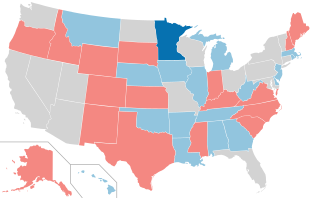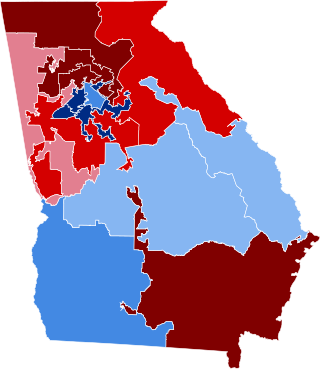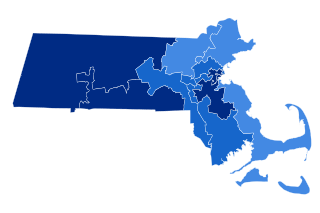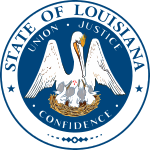
The 1990 United States Senate elections were held on Tuesday, November 6, 1990, with the 33 seats of Class 2 contested in regular elections. Special elections were also held to fill vacancies. The Democratic Party increased its majority with a net gain of one seat from the Republican Party. The election cycle took place in the middle of President George H. W. Bush's term, and as with most other midterm elections, the party not holding the presidency gained seats in Congress. This was the first time since 1980 that any party successfully defended all their own seats, and the first time Democrats did so since 1958.

The 1986 United States Senate elections were elections for the United States Senate. Held on November 4, in the middle of Ronald Reagan's second presidential term, the 34 seats of Class 3 were contested in regular elections. The Republicans had to defend an unusually large number of freshman Senate incumbents who had been elected on President Ronald Reagan's coattails in 1980. Democrats won a net of eight seats, defeating seven freshman incumbents, picking up two Republican-held open seats, and regaining control of the Senate for the first time since January 1981. This remains the most recent midterm election cycle in which the sitting president's party suffered net losses while still flipping a Senate seat.

The 1978 United States Senate elections were held on November 7, in the middle of Democratic President Jimmy Carter's term. The 33 seats of Class 2 were contested in regular elections. Special elections were also held to fill vacancies.

The 1972 United States Senate elections were held on November 7, with the 33 seats of Class 2 contested in regular elections. They coincided with the landslide re-election of Republican President Richard Nixon. Despite Nixon's landslide victory, Democrats increased their majority by two seats. The Democrats picked up open seats in Kentucky and South Dakota, and defeated four incumbent senators: Gordon Allott of Colorado, J. Caleb Boggs of Delaware, Jack Miller of Iowa, and Margaret Chase Smith of Maine. The Republicans picked up open seats in New Mexico, North Carolina, and Oklahoma, and defeated one incumbent, William B. Spong Jr. of Virginia.

The 1970 United States Senate elections was an election for the United States Senate. It took place on November 3, with the 33 seats of Class 1 contested in regular elections. Special elections were also held to fill vacancies. These races occurred in the middle of Richard Nixon's first term as president. The Democrats lost a net of three seats, while the Republicans and the Conservative Party of New York picked up one net seat each, and former Democrat Harry F. Byrd Jr. was re-elected as an independent.

The 1964 United States Senate elections were held on November 3. The 33 seats of Class 1 were contested in regular elections. Special elections were also held to fill vacancies. They coincided with the election of President Lyndon B. Johnson by an overwhelming majority, to a full term. His Democratic Party picked up a net two seats from the Republicans. As of 2023, this was the last time either party has had a two-thirds majority in the Senate, which allowed the Senate Democrats to override a veto, propose constitutional amendments, or convict and expel certain officials without any votes from Senate Republicans. However, internal divisions would have prevented the Democrats from having done so. The Senate election cycle coincided with Democratic gains in the House in the same year.

United States gubernatorial elections were held on November 7, 2006, in 36 states and two territories. The elections coincided with the midterm elections of the United States Senate and the United States House of Representatives.

The United States House of Representatives elections in Washington were held on November 2, 2004. Washington has nine members in the House of Representatives, as apportioned during the 2000 census, and all nine seats were up for re-election. There were two open seats in the 5th and 8th districts when Republicans George Nethercutt and Jennifer Dunn, respectively, retired. No seats changed party this year.

The first round of the Louisiana House election of 2006 were held on Tuesday, November 7, 2006. The terms of all seven Representatives to the United States House of Representatives will expire on January 3, 2007, and will be put up for contest. The winning candidates will serve a two-year term from January 3, 2007, to January 3, 2009. If necessary, a runoff round will be held on December 9, 2006.

The 2006 United States House of Representatives elections in Oregon were held on November 7, 2006, to select Oregon's representatives to the United States House of Representatives. All five seats were up for election in 2006, as they are every two years. All five incumbents were re-elected, four of them by large margins; only the 5th district was somewhat competitive.

The 2002 United States House of Representatives elections in South Carolina were held on November 5, 2002 to select six Representatives for two-year terms from the state of South Carolina. The primary elections for the Democrats and the Republicans were held on June 11 and the runoff elections were held two weeks later on June 25. All five incumbents who ran were re-elected and the open seat in the 3rd congressional district was retained by the Republicans. The composition of the state delegation remained four Republicans and two Democrats.

The 1904 United States House of Representatives elections in South Carolina were held on November 8, 1904, to elect seven representatives Representatives for one two-year terms from the state of South Carolina. All five incumbents who ran were re-elected and the open seats in the 2nd congressional district and 6th congressional district were retained by the Democrats. The composition of the state delegation thus remained solely Democratic.

The 2008 congressional elections in Wisconsin were held on November 4, 2008, to determine who would represent the state of Wisconsin in the United States House of Representatives. Representatives were elected for two-year terms; those elected served in the 111th Congress from January 3, 2009, until January 3, 2011. The election coincided with the 2008 U.S. presidential election and other Wisconsin elections.

The 2002 House elections in Washington occurred on November 5, 2002 to elect the members of the State of Washington's delegation to the United States House of Representatives. Washington has nine seats in the House, apportioned according to the 2000 United States census. Though competitive races occurred in several districts, no seat switched hands as a result of the elections this year.

The 2004 House elections in Georgia occurred on November 2, 2004, to elect the members of the state of Georgia's delegation to the United States House of Representatives. Georgia has thirteen seats in the House, apportioned according to the 2000 United States census.

The 2002 House elections in Georgia occurred on November 5, 2002 to elect the members of the State of Georgia's delegation to the United States House of Representatives. Georgia has thirteen seats in the House, apportioned according to the 2000 United States census.

The 2004 House elections in Kentucky occurred on November 2, 2004, to elect the members of the State of Kentucky's delegation to the United States House of Representatives. Kentucky had six seats in the House, apportioned according to the 2000 United States census.

The 2004 congressional elections in Massachusetts was held on November 2, 2004, to determine who would represent the state of Massachusetts in the United States House of Representatives. Massachusetts had ten seats in the House, apportioned according to the 2000 United States census. Representatives are elected for two-year terms; those elected were served in the 109th Congress from January 3, 2005 until January 3, 2007.

The 2004 United States House of Representatives Elections in Florida were held on November 2, 2004, to determine who would represent the state of Florida in the United States House of Representatives. Representatives are elected for two-year terms; those elected served in the 109th Congress from January 3, 2005, to January 3, 2007. The election coincided with the 2004 U.S. presidential election as well as an election to the United States Senate.

The 2000 House elections in Washington occurred on November 7, 2000, to elect the members of the State of Washington's delegation to the United States House of Representatives. Washington has nine seats in the House, apportioned according to the 1990 United States census. This election saw the Democrats flip one Republican-held open seat. These elections occurred alongside Al Gore's victory in the state over George W. Bush in the presidential election.




















